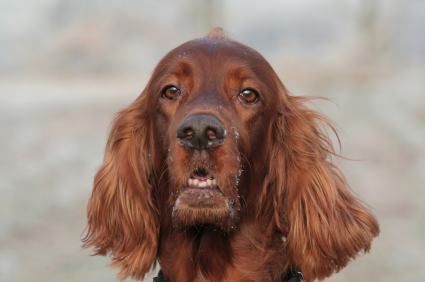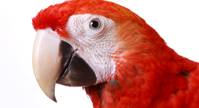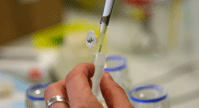Canine Leukocyte Adhesion Deficiency (CLAD)
Description:
 Canine Leukocyte Adhesion Deficiency (CLAD) is an autosomal recessive mutation that affects Irish Setters and Irish Red and White Setters. The mutation prevents white blood cells from adhering to, and eliminating, harmful bacteria and viruses. Since the white blood cells are not functioning properly, the immune system cannot fight off infections. Affected puppies will develop multiple infections, most notably gum and umbilical infections, and die fairly quickly.
Canine Leukocyte Adhesion Deficiency (CLAD) is an autosomal recessive mutation that affects Irish Setters and Irish Red and White Setters. The mutation prevents white blood cells from adhering to, and eliminating, harmful bacteria and viruses. Since the white blood cells are not functioning properly, the immune system cannot fight off infections. Affected puppies will develop multiple infections, most notably gum and umbilical infections, and die fairly quickly.
CLAD is a recessive disorder. Dogs with one copy of the CLAD mutation are known as carriers and do not present symptoms. It is estimated that over 10% of Irish Setters are carriers of the mutation. Since carriers do not show any symptoms of the mutation, testing is crucial to identify carriers of CLAD before breeding. If two carriers are bred to one another, there is a 25% chance per puppy born that it will develop symptoms of CLAD and a 50% chance per puppy that it will be a carrier of CLAD.
Sample Type:
Animal Genetics accepts buccal swab, blood, and dewclaw samples for testing. Sample collection kits are available and can be ordered at Canine Test Now.
Test Is Relevant to the Following Breeds:
- Irish Setters
Results:
Animal Genetics offers DNA testing for Canine Leukocyte Adhesion Deficiency CLAD. The genetic test verifies the presence of the recessive CLAD mutation and presents results as one of the following:
| CL/CL | Affected | The dog carries two copies of the mutant gene and is homozygous for the CLAD mutation. The dog will display symptoms associated with the disorder and will always pass a copy of the mutation to its offspring. |
| CL/n | Carrier | Both the normal and mutant copies of the gene detected. The dog is a carrier for CLAD and could pass on either allele to any offspring 50% of the time. |
| n/n | Clear | Dog tested negative for the CLAD mutation and will not pass on the defective gene to its offspring. |
Submit a Sample for Testing:
To submit a sample for testing please go to Canine Test Now.
To
order a sample collection kit please go to order sample collection kits.
Cost per sample is $45.00. Please see our Canine Fee Schedule for all test rates.










